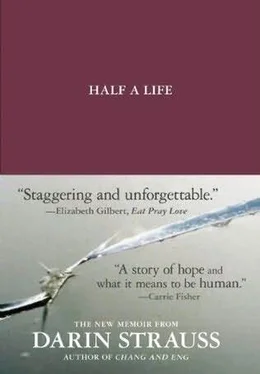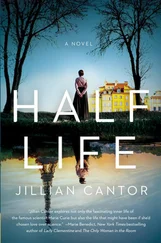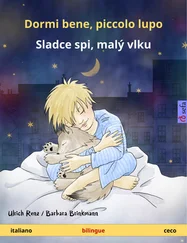All because, as the Zilkes’ lawyer finally told them, there really was no case.
Some years ago, researchers at George Washington University studied the psychological effect of what police call “dart-out” deaths and what insurers call a “no-fault fatality”: car crashes, like Celine’s and mine, where someone hurries into an automobile. In the United States, some two thousand drivers a year survive “dart-outs.” And these drivers are more likely to get laid out by post-traumatic stress syndrome than are those who are irrefutably to blame in fatal accidents. No one knows why. Probably the brain prefers a sturdy error to fixate on. It’s hard to learn so viscerally that the questions of guilt and worth are managed with indifference, by nasty chance.
We’d had the accident at the age when your identity is pretty much up for grabs. Before it, I hadn’t been so introspective; I’d had nothing to introspect about. Nor had I hidden anything from the world.
For years, when I woke each morning, no matter where I was — home, my dorm, some friend’s couch, a woman’s bed — if I took an inventory of all that was good and bad in my life, the good would change (as it tends to do). But the bad remained a constant — Celine’s unresolved death, the sharp menace of a trial: that clock that ticked in my life. However, the world now meant to put Celine behind me. The New York Justice System’s gaze had moved to newer, bigger problems. No one would ever weigh in. I couldn’t call a trial for myself, say: “Please investigate me.” And so now, forever, I’d need to be satisfied with a personal answer, the one I’d never been prepared to give myself.
I thought my trial’s collapse would bring — to use a dicey, odious buzzword—“closure.” But there was no end to something like this, of course. For me the question, the black scribble in the margin, will always be Celine.
The biggest fact about me — the part that threw me into three dimensions — was her. My accident explained frowns and, for better or worse, gave depth and chiaroscuro to smiles. It revealed everything about the personality I’d created for myself, starting from age eighteen. But it was not something you say to people. I was less fully developed than the chimps in that Amy Hempel story. I didn’t have access to a language of grief.
So: hiding. For example, on dates when I traveled the city as a single man. Every new person you date is a freshly arrived celebrity on your radar: you have to learn her backstory, how she ended up on the studio lot, what roles she can play, if she’s funny, charming, angry, sensitive. At the restaurant or wherever, I’d be talking, just getting-to-know-you stuff. But I’d have to also wonder: When do I tell her? Can I tell her? The answers were nearly always “Never” and “No.”
I did spill the story to a few women — often those who, judging by their own hesitations, seemed to have scraped through some trouble of their own. Women who’d faced something ambiguous or complex in their parents’ lives (we were that type of cohort). This came up a lot, small winces around the topic. Or maybe they’d had some wounding challenge (anorexia, depression, romances gone sadistic) during adolescence. I felt pulled by the lure of hard-won wisdom.
And so I would find myself confessing to women out of some dull and indefinable obligation, as someone else might feel about a schizophrenic family member or a stint at juvie. You think you know who I am? Well, here’s the guy very much behind the social Darin.
But then, I hated the reaction. They grew tender — they patted, deferred, nuzzled. They forgave . I saw them really begin to watch me. I felt the web of moments they cleared from certain interactions, that they wiped off the face of a conversation: Ah, he’s like this because of that . There was something gross about it. Even the truth had a lie’s sourness. This was the big problem of confessing, the problem of recognition. I had to do a mental squint just to see myself. And rather than turning life more difficult, as I thought it should, the declaration always got me to feel I’d used Celine’s death to obtain softer hours, gentler treatment.
There had been one young woman who’d come out of a long and life-threatening sickness. When I’d owned up to her (I thought: This woman’s life has been so difficult, but now she’s in the clear. She must have the right thing to say), she simply, cheerfully, and forthrightly stepped out of the momentum of our relationship. What she now wanted from her newly healthy life couldn’t be guaranteed by me: a lucky passage, an easy, bright course. I understood. Whenever I visualize this non-relationship, I see myself grounded at a restaurant table (I told her in a gloomy bistro) and then her naturally migrating to a better, more livable climate. Her manner was a combination of supportive and adios . This seemed just. It seemed self-protective and — considering the eighty-odd years we’re given to find our best accommodations on the planet — right.
Nevertheless, with others I acted it all out anyway, falling into my scripted role of assisted suppliant. And felt disgusted — with the unannounced caresses, with myself for accepting them. For allowing myself to be pressed further into an artificial role. “Aw, everything’s okay,” said a huggy med student. Her name was Cindy, and her hands were ineffectual balms: poking bones, cold fingertips on my cheek. “Oh, sweetie honey,” said Felicia, a not-quite-love-match sitting on her studio apartment’s lumpy futon. A TV was glaring across the small dinner table. She reached for the remote, and whatever show had been on now lowered its voice, and I saw Mr. Zilke putting that coaster underneath my iced tea. (TV seemed, to Felicia, inappropriate background for the discussion.) No matter how stark the trauma, life — wet rings on wood, television’s surges and volume drops — kept on. “That’s got to be one of the saddest things I personally have ever heard,” Felicia said. “But you have me now.” She often listened to The Cure and was in thwarted, tragic love all the time. And here’s Stacey, who was acting like Juliette Binoche in The English Patient (the movie we’d just seen): “I’ll take care of you.”
“Um, I don’t know,” I said — and said. I kept waiting to become more who I thought I should be. Sometimes I would think, appallingly: “Good.” Or, if I was in an optimistic mood, I hoped the woman might actually tell me something that perched in the soul and sang the tune.
Instead, Stacey’s eyes got big and wifey. Felicia just scooted closer.
“It’s been easier than I thought,” I’d say drably, if I wanted to look brave. “I don’t know.”
“I’m sure it can seem easier, might be the way you feel sometimes,” Felicia said. “But.”
“Thank you, though,” I’d hear someone with my voice say. “You’re very kind.”
(It was like this with everyone but the newly healthy girl at that gloomy bistro — Jacqueline. When I told Jacqueline, she slitted her eyes. She was making wind-resistance and weather calculations, anyone could see it. She already had the elsewhere stare of a break-up. I dropped a clumsy hand to the table and splashed my salad. Then, months later, I ran into Jacqueline again. I was now taking classes in an MFA program. At a party thrown by a student I knew, there was her trademark glossy dark hair and the flash of her teeth. Jacqueline really stood out amid the frayed ends and premature grays of grad school. I asked if she’d ended things because of what I’d told her. And she said — this was so diplomatic, it became one of those details I made a point of remembering, in case I’d ever need to reproduce it—“You just seemed like you had a lot to work out, Darin. And I thought maybe you could work it out easier without having to worry about how you sound to someone else.”
Читать дальше









